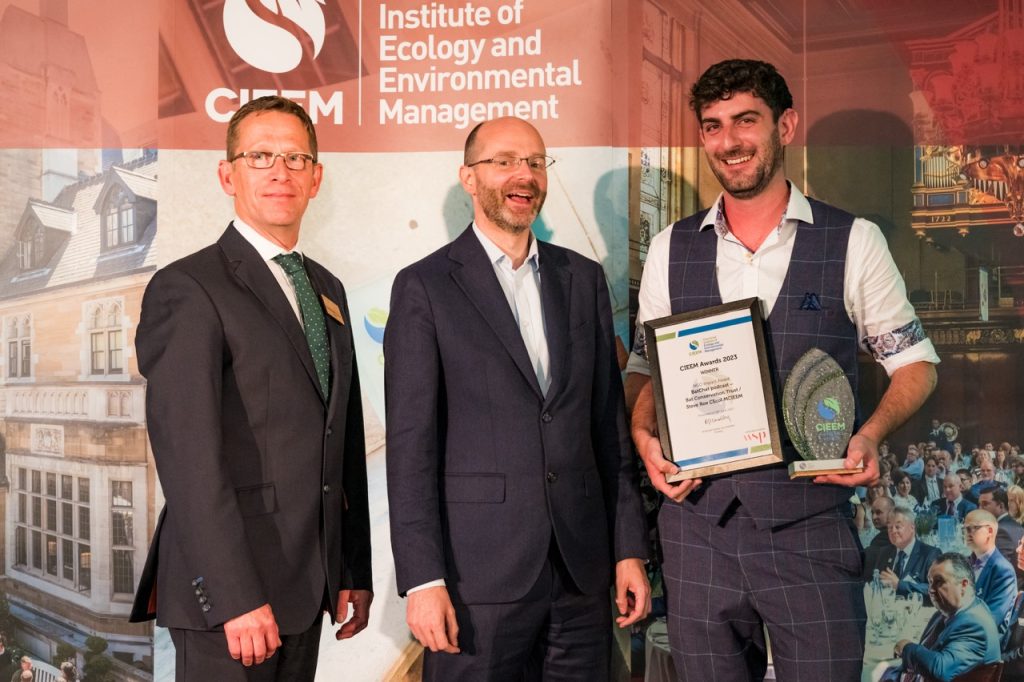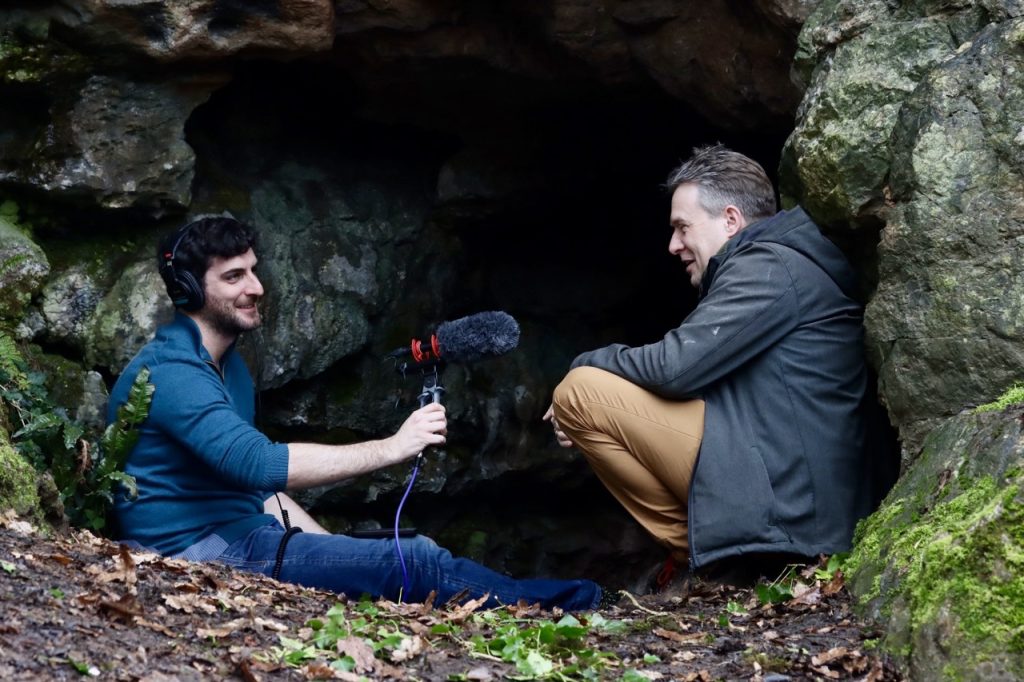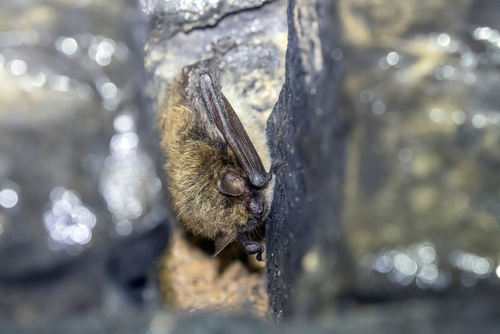
If you're a fan of bats and you've not yet heard of BatChat - you're really missing out!
BatChat is a podcast designed for members of the Bat Conservation Trust (BCT), but its a great listen for anyone with an interest in ecology too. Each episode is produced and presented by Steve Roe, a well-known figure in the UK's bat community, who chats to a wide variety of people involved in bat conservation projects around the UK.
BatChat is boasting over 18,000 downloads in 2023 alone, and won the CIEEM award for NGO Impact in 2023. The Wildcare team are very proud to be sponsoring the podcast again in 2024, alongside Wildlife Acoustics. In this blog, Steve is taking the interviewee's seat for a change, to answer our questions about the podcast and his deep rooted love of bats.
Here's what we asked:
Q: As well as being a trustee of the BCT and active in your local bat group, you're a professional ecologist too. What first inspired you to start in ecology, and your interest in bats in particular? Are there any other protected species that you work with?
A: The interest in bats came first. We used to get bats flying over the garden in the summer when I was young and I was fascinated with them. A talk by Staffordshire bat group in a local library and then a bat talk and walk soon after with Derbyshire bat group had me hooked. I started volunteering with my local bat group at the age of 12 and by the time I came to do my first week of work experience I had met several consultant ecologists that were members of the bat group at that time. Once I realised I could make a living from working with bats that was it! I actually gained my bat licence before I went to University. After Uni I applied for a role at FPCR Environment & Design Ltd and I’m still there 13 years later! Over the years I’ve worked with several protected species in that time including barn owls, great crested newts and reptiles but now solely work and specialise in bats.
Q: The first series of BatChat started in November 2019. Can you tell us a little bit about where the idea for a podcast came from, and how you were able to bring it to life?
A: Podcasts have officially been around for 20 years now, but I didn’t get into listening to them until around 2016 when they hit mainstream popularity. There was a podcast called the Wildflower half hour, a spin-off from the twitter hashtag wildflowerhour and the journalist Isabel Hardman was undertaking interviews out in the field with botanists. Searching for other natural history podcasts it was clear there was a real gap in that category and I started thinking whether it would work for BCT. I already had the audio-editing skills thanks to having worked with bat echolocation calls for years; it would just mean working with audio that was within my own hearing range! I started putting together a proposal for a BCT podcast for the comms team (it didn’t have a name at that stage) during 2017-2018. In the autumn of 2018, BCT staff Joe Nunez-Mino and Lisa Worledge were staying over at my place as a result of an evening launch of the new Derbyshire bat group website and had each given a talk that evening. The next morning whilst they were searching for where I kept the coffee they were listening to me being interviewed by BBC Radio Derby about the work of the group as a result of the launch event the night before. Getting back home and finally managing some hospitality by cooking breakfast, Joe commented that I had a ‘really good Radio 4 voice’ at which point I dropped in the idea of a podcast and gave him the proposal. A few days later and Joe came back to me with a ‘yes; what do you need from us’ and the rest is history.

Q: Season 5 has just finished up - we've loved listening to it (particularly episode 5!) Now you've covered numerous bat conservation projects around the country, which been your favourite story or interviewee?
A: Yes the Worcestershire bat group episode was really fun to record. I met a few members for drinks and food at a nearby pub which got the evening off to a good start! It’s really hard to pick a single one out but I think my favourites are those episodes which feature the stalwarts of the bat conservation movement; Shirley Thompson, Tony Hutson, Bob Stebbings and David King because it’s amazing to go back in time and remind ourselves just how much things have changed in the last 40/50 years of bat conservation. When I heard the news of Tony passing away a few months after we recorded his interview it was incredibly sad and I felt privileged to have managed to talk to him and that we’d managed to capture his passion, dedication and sense of humour for one of the founders of the bat groups of Britain (now the Bat Conservation Trust).
Q: You've just started recording for season 6 too. Anything exciting planned that you can reveal?
A: Well I get to visit some amazing places as a result of BatChat and all I’ll say is that this winter I got to see my first ever hibernating Nathusius’ pipistrelle!

Q: You have been commended recently for your dedication to bat conservation in many forms by receiving the BCT's Pete Guest Award at the National Bat Conference in 2023. Very well deserved! What would you say is the most important thing that someone with an interest in wildlife can do for bats or ecology and conservation?
A: Stick at it. As Chris Packham said in his interview to me during the first few days of the COVID-19 lockdown, you have to have a certain kind of passion to study bats. They’re really hard to survey given their nocturnal habits, silent nature and tiny size but it’s so rewarding. The other top thing you can do is join the Bat Conservation Trust and your local bat group! I’m always amazed by just how many areas BCT manage to cover for bats; if anyone is interested, have a look at the annual reports on their website to get a flavour for just how much they do for such a small charity!
Q: Finally, of course - your favourite bat?
A: Well I’ve always enjoyed a Brandt’s bat. They’re always under-represented when this question is asked (everyone goes for the glamorous, rare species don’t they). We actually know very little about Brandt’s bats because they’re always lumped in together with whiskered and Alcathoe due to the difficulty in identifying them and there’s loads about their ecology that we don’t know as a result of this. I suspect the number of studies done on rare bats means we have a better idea of the population sizes of species such as Bechstein’s and Barbastelle than we do about Brandt’s! We seem to have a good stronghold for the species in the Peak District and they are such smart little bats when they turn up at underground sites in the autumn and winter.

If readers would like to listen to the podcast where do they need to go?
You can listen to the podcast either directly via the BCT website, linked here, but also on any of the usual podcast streaming platforms, including Apple Podcasts, Spotify, Google Podcasts and Amazon Music. All episodes and bonus episodes are available if you need to catch up! Season 5 has recently concluded, and season 6 will start in autumn 2024.
Thanks again to Steve Roe for his work on the podcast, and helping with this blog. If you'd like to support bat conservation work, head to the BCT website www.bats.org.uk to become a member, donate or volunteer. You can also head to our Bat Conservation Trust supporter's page, where Wildcare will donate 10% of sales revenue to the BCT.
If you have any questions about BatChat, contact Joe Nunez-Mino at the BCT Press office email [email protected] or phone 020 7820 7183




